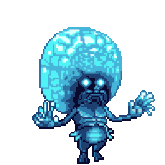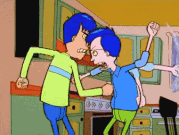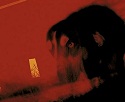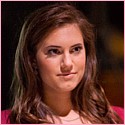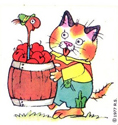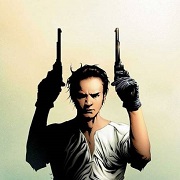|
My understanding of the Book of the New Sun is that there is a big overarching plot which most of the events are a part of, the books are just narrated by a pawn in that plot who's too dim to ever realize it. There are a handful of thesis-length books written about what's actually going on in the series, but I don't think they're necessary to enjoy it. Just keep in mind that Gene Wolfe is pretty much a Proust-reading version of the Coyote figure from Native American folklore.
|
|
|
|

|
| # ? May 16, 2024 01:54 |
|
BigSkillet posted:My understanding of the Book of the New Sun is that there is a big overarching plot which most of the events are a part of, the books are just narrated by a pawn in that plot who's too dim to ever realize it. There are a handful of thesis-length books written about what's actually going on in the series, but I don't think they're necessary to enjoy it. Ok, that is good to know! I might actually look into Solar Labyrinth if I have the urge to reread the books, as it's only $4 on Kindle.
|
|
|
|
BotNS doesn't read at all like most sci-fi or fantasy you are used to, and I feel your summary of it is mostly accurate. One thing happens, and then another thing happens, then another thing happens until you reach the end of the third book. Spoiler warning for this whole post: There is character development and--what for me was the most enjoyable--amazing writing of an impossible world that felt completely real. If you've ever read any of Sanderson or that Dresden Files guy's writing advice (I've read the former but not the latter's novels, but both of their writing advice) where they lay out try/fail cycles and how to write entertaining and fiction that sells, Gene Wolfe is totally different from anything like that. In a Sanderson book or in the Name of the Wind, you often have the protagonist facing a very smug and annoying mini-antagonist that makes you sympathize more with the protag; the antagonist/bully is conceited, petty, and can only outdo the protag by cheating or lying, while the protag has to usually suffer silently because no one would believe them (maybe because they are poor, a slave, or something else that makes them an underdog). There is this kind of build up of the trope: the protag is slighted and you feel more for them, and the author is basically letting you know: "This bully character will get what is coming to them. The protag is going to do something clever or something that otherwise shows their strengths and how they overcame conflict etc. etc." There are a lot of tropes like the minor bully one that genre authors will use, and when you spot one--even subconsciously--you are ready to see how it will play out. Tropes like this can be enjoyable to read when done well, and when done very well they can hook you and give you something that lets your brain kind of autopilot while you absorb other aspects of the fantasy/sci-fi world that may have a steeper learning curve. Wolfe more or less ignores anything like this, and I think it's what makes him so hard to read. Severian has this amazing sword, but he uses it to behead people and fight. Other than being quite sharp, it's just a sword. It breaks somewhere in book three and doesn't really matter. The protag's legendary sword is just a sword. The claw is a magic artifact that Severian finds, but he never figures out how to work it, and it's unclear whether the claw really did anything at all or if it was Severian himself. Major plot events, battles, and confrontations are often glossed over or skipped completely. Severian is set up to judge a story-telling contest where the winner gets to marry the girl, and everyone in the contest gets blown up before Severian decides. If you read it expecting it to be a regular genre book, it is essentially going to "break its promise" every time you think you spot a fantasy or sci-fi trope. It is also going to break the promise of many plot elements or character relationships: Jolenta dies almost at random, Severian becomes Thecla, Jonas disappears into a mirror, Dorcas wanders off, the storytellers I mentioned earlier are blown up. Wolfe isn't really making any of these promises, but your brain is conditioned to look for them and assume these promises. I think people say it's best on the second read because it's only after reading all three books that you realize he isn't actually promising what you think. angel opportunity fucked around with this message at 05:26 on Apr 22, 2014 |
|
|
|
BigSkillet posted:Just keep in mind that Gene Wolfe is pretty much a Proust-reading version of the Coyote figure from Native American folklore.
|
|
|
|
quote:Warbound, Book III of the Grimnoir Chronicles Did a quick google on this, assuming it was satire. It doesn't appear to be? Did someone really title their book this way for real?
|
|
|
|
Seldom Posts posted:Did a quick google on this, assuming it was satire. It doesn't appear to be? Did someone really title their book this way for real?
|
|
|
|
BigSkillet posted:My understanding of the Book of the New Sun is that there is a big overarching plot which most of the events are a part of, the books are just narrated by a pawn in that plot who's too dim to ever realize it. There are a handful of thesis-length books written about what's actually going on in the series, but I don't think they're necessary to enjoy it. This is absolutely true. The issue with reading BotNS like a standard fantasy novel, looking for the "overarching plot" is that the plot is pretty well hidden (one of the biggest pieces of the puzzle isn't given to you until two or three pages from the end of the book, in fact - "I am not the first Severian"), so it almost necessitates a 2nd read. For me, what makes BotNS so amazing is a number of things: the way Wolfe applies Proust to a dying earth fantasy world (seriously, the ruminations at the beginning of the book about Sev's childhood among the torturers is achingly well-written), the Nabokovian games he plays with time and memory, and prose that's head and shoulders above any other fantasy author I've ever read. It's not an easy read by any means, but it's incredibly rewarding. I'll probably be rereading it every now and then for the rest of my life (which I can't say about many novels, fantasy or otherwise.)
|
|
|
|
Comparing Wolfe to Nabokov is kind of an insult to the latter. Personally, I consider Wolfe more or less unreadable. Nabokov, for all his high concepts, writes literature that's actually enjoyable to read. The Book of the New Sun is basically the genre's Ulysses - which is to say that it's so busy being clever and "literary" that it forgets to tell a story while it's doing so. Also just like Ulysses, there's probably about ten times more people who will tell you how deep and awesome it is than there are people who actually finished it.
|
|
|
|
quote:Gene Wolfe applies Proust I am really hoping that the main character frets for 200 pages because a door harasses him now.
|
|
|
|
Cardiovorax posted:Comparing Wolfe to Nabokov is kind of an insult to the latter. Personally, I consider Wolfe more or less unreadable. Nabokov, for all his high concepts, writes literature that's actually enjoyable to read. The Book of the New Sun is basically the genre's Ulysses - which is to say that it's so busy being clever and "literary" that it forgets to tell a story while it's doing so. Ulysses is awesome, though? And I dunno how you read passages like this - quote:We believe that we invent symbols. The truth is that they invent us; we are their creatures, shaped by their hard, defining edges. When soldiers take their oath they are given a coin, an asimi stamped with the profile of the Autarch. Their acceptance of that coin is their acceptance of the special duties and burdens of military life—they are soldiers from that moment, though they may know nothing of the management of arms. I did not know that then, but it is a profound mistake to believe that we must know of such things to be influenced by them, and in fact to believe so is to believe in the most debased and superstitious kind of magic. The would-be sorcerer alone has faith in the efficacy of pure knowledge; rational people know that things act of themselves or not at all. and call it 'unreadable', but different strokes, I guess. Popular Human fucked around with this message at 16:23 on Apr 22, 2014 |
|
|
|
Kraps posted:I noticed that the chart in the op has GoT as low fantasy and the Stormlight Archive as high fantasy. I was recently thinking about genres because I was explaining to my brother what "sword and sorcery" is. I would have thought GoT is also high fantasy; is it not because of the relatively low amounts of magic use? That seems kind of arbitrary to me. They're there because people said they should be there. For what it's worth,  fantasy was originally labelled "epic fantasy". The etymology of "high fantasy" is that Tolkien described his writing as "'high', purged of the gross" (googling it, I found it attributed to his Collected Letters, no 131), i.e. "no sex please, we're Elfish". High fantasy began as imitations of archaic poems, then changed to Tolkien-imitations, and now means whatever it doesn't mean; low fantasy is just a backformation. fantasy was originally labelled "epic fantasy". The etymology of "high fantasy" is that Tolkien described his writing as "'high', purged of the gross" (googling it, I found it attributed to his Collected Letters, no 131), i.e. "no sex please, we're Elfish". High fantasy began as imitations of archaic poems, then changed to Tolkien-imitations, and now means whatever it doesn't mean; low fantasy is just a backformation.Popular Human posted:For me, what makes BotNS so amazing is a number of things: the way Wolfe applies Proust to a dying earth fantasy world (seriously, the ruminations at the beginning of the book about Sev's childhood among the torturers is achingly well-written), the Nabokovian games he plays with time and memory, and prose that's head and shoulders above any other fantasy author I've ever read. You might enjoy John Crowley's "AEgypt" quartet, which is not only beautifully written but touches on some of the themes you mention enjoying here - time, memory, and recollections of childhood. RVProfootballer posted:I quite liked it when I read it a few months ago, but I've come to appreciate the more modern style with a comprehensible, overarching plot line. BotNS and a few other older fantasy books I've read lately (Viriconium comes to mind) have been good and interesting, but I rarely had any idea what the next stop in the story would be. Stuff just happens and leads to the next interesting vignette. I don't know exactly how to describe it better than that except by contrast. For example, even when something unexpected happens in, say, ASoIAF, it is understandable and fits some overall plot: everyone tries to gently caress over everyone else to get more power, the various separate groups are each working towards a somewhat more specific goal, that kind of thing. Does that seem like a reasonable description of the difference in style when it comes to plot or did I really miss some big plot hints in BotNS? As systran sez Wolfe is playing a different ball game. He's really not a writer about the rational and explicable; the events are following a logic that's more to do with emotion, dreams, the unconscious, and characterisation. It does allow you to enjoy New Sun on a surface level as a picaresque, though. ~ The only thing I've read this year that fits in this thread is "Beowulf". What struck me is that fighting people inevitably leads to revenge, but Beowulf doesn't really do this; he goes after monsters without clans to look after them - Grendel does, of course, but he's only got the one dam so she's easy to deal with. In a way it makes me think that the poem chickens out of dealing with the consequences of violence (one man's death being small beer compared to a possible cycle of revenge going on for generations) because of its use of fantasy. I suppose another way to read it is that it advises prospective heroes to choose targets without family and clan behind them, so you can be sure to annihilate them and be safe from either vengeance or other people writing the history.
|
|
|
|
Popular Human posted:Ulysses is awesome, though? And I dunno how you read passages like this -
|
|
|
|
Cardiovorax posted:Comparing Wolfe to Nabokov is kind of an insult to the latter. Personally, I consider Wolfe more or less unreadable. Nabokov, for all his high concepts, writes literature that's actually enjoyable to read. The Book of the New Sun is basically the genre's Ulysses - which is to say that it's so busy being clever and "literary" that it forgets to tell a story while it's doing so. House Louse posted:They're there because people said they should be there. For what it's worth, coyo7e fucked around with this message at 18:53 on Apr 22, 2014 |
|
|
House Louse posted:They're there because people said they should be there. For what it's worth, Yeah, this is what I was getting at when I said I've seen "high fantasy" just used to mean "high art". Thanks for the specific cite though -- I knew I'd seen it used that way but I couldn't remember where and it was starting to really annoy me. Cardiovorax posted:Comparing Wolfe to Nabokov is kind of an insult to the latter. Personally, I consider Wolfe more or less unreadable. Nabokov, for all his high concepts, writes literature that's actually enjoyable to read. The Book of the New Sun is basically the genre's Ulysses - which is to say that it's so busy being clever and "literary" that it forgets to tell a story while it's doing so. Wolfe is a really interesting author and I like his work for its imagery and inventiveness but I'll grant you that he would have a hard time plotting his way out of a paper bag. He's a writer for writers and critics, not a writer with mass appeal. And I *have* actually read all of the Book of the New Sun, even Urth. Still haven't made it through Long Sun though, mostly just because I don't have a full set of the books yet. Hieronymous Alloy fucked around with this message at 19:05 on Apr 22, 2014 |
|
|
|
|
coyo7e posted:I'm curious to hear what you thought of Dhalgren? Hieronymous Alloy posted:Wolfe is a really interesting author and I like his work for its imagery and inventiveness but I'll grant you that he would have a hard time plotting his way out of a paper bag. He's a writer for writers and critics, not a writer with mass appeal. Cardiovorax fucked around with this message at 19:38 on Apr 22, 2014 |
|
|
|
Cardiovorax posted:I've never read it. From its reputation I don't think I would enjoy it, but I'd have to get back to you on that. coyo7e fucked around with this message at 19:23 on Apr 22, 2014 |
|
|
|
coyo7e posted:This was kind of what I was trying to get at earlier when I said high fantasy is about hero quests and happy endings So ASOIAF is high fantasy then?  I should stop reading the bad thread. I should stop reading the bad thread. Anyways, the distinction between low and high fantasy is to me at least pretty irrelevant. It seems more like a older distinction to separate fantasy novels, which is less relevant considering how the fantasy field have exploded since Tolkien. To me they can easily be clumped together as one genre.
|
|
|
|
Hieronymous Alloy posted:Wolfe is a really interesting author and I like his work for its imagery and inventiveness but I'll grant you that he would have a hard time plotting his way out of a paper bag. He's a writer for writers and critics, not a writer with mass appeal. The greatest thing I have ever read are the Gormenghast books by Mervyn Peake. Hearing what you guys are saying about Gene Wolfe makes me think I might like it too. I didn't set out to be a snob, but I think I might be.
|
|
|
coyo7e posted:Eh, it has a protagonist who pretty much is Down to gently caress everybody that moves so if you're super goony about sex scenes (and gay sex scenes as well) it might cause you to knee-jerk throw it away when he goes down on a big gay bear of a biker early in the book however, the sex also sort of fits into the anarchic, amnesiac vibe of The City. It really comes out best on a second read when you start realizing what was going on the entire time, maybe, because everything moves in a circle. I'd love a Dhalgren thread since there's a lot to glean and any one reader only catches half or less. I think we could all help each other appreciate it even more.
|
|
|
|
iron_weasel posted:The greatest thing I have ever read are the Gormenghast books by Mervyn Peake. Hearing what you guys are saying about Gene Wolfe makes me think I might like it too. I didn't set out to be a snob, but I think I might be. Yeah, if you liked Ghormenghast you'll probably also like Wolfe. Wolfe's stuff isn't as funny as Peake's but it's weirder and has even more abstruse and esoteric wordplay.
|
|
|
|
|
mdemone posted:I'd love a Dhalgren thread since there's a lot to glean and any one reader only catches half or less. I think we could all help each other appreciate it even more. We could nominate it for the next Awful Book (a.k.a. the book club most desperately in need of a name change) of the month.
|
|
|
Joramun posted:We could nominate it for the next Awful Book (a.k.a. the book club most desperately in need of a name change) of the month. I still kinda want to keep the book of the month clear of sci-fi and fantasy at least for a few more months. I say this as a huge fantasy dork, but even for me, there's so much SF&F around here it sometimes overwhelms everything else. I kinda see the Book of the Month as the escape valve for everyone who might want non-dragon-based discussion. That may change once we've had a few months more with different genres and book types, especially if we get a few more running megathreads that involve neither wizards nor spaceships.
|
|
|
|
Hieronymous Alloy posted:I still kinda want to keep the book of the month clear of sci-fi and fantasy at least for a few more months. I say this as a huge fantasy dork, but even for me, there's so much SF&F around here it sometimes overwhelms everything else. I kinda see the Book of the Month as the escape valve for everyone who might want non-dragon-based discussion. I'd venture to say that the forum could support two book clubs, keeping the current thread as well as adding a monthly SF/F thread. There seems to be enough readership here in each genre to contribute in a worthwhile way to both clubs.
|
|
|
|
|
Hieronymous Alloy posted:I still kinda want to keep the book of the month clear of sci-fi and fantasy at least for a few more months. I say this as a huge fantasy dork, but even for me, there's so much SF&F around here it sometimes overwhelms everything else. I kinda see the Book of the Month as the escape valve for everyone who might want non-dragon-based discussion. I know the other stuff I read by Delany seemed way more fantasy/sci-fi than Dhalgren did. I'd recommend reading the book twice, or at least going back to the first chapter once you finish the first time. Edit: I'm no lit major but I wouldn't mind starting up a Dhalgren thread sometime. Not sure what a decent OP would entail except big spoilered walls of text and maybe some fan/cover art. There is only one viable thread title for that though, "I have come to" edit: whoa crap, I never realized that the name of the city was a reference to Bellona! coyo7e fucked around with this message at 20:43 on Apr 22, 2014 |
|
|
|
I've had Dhalgren sitting on my desk in my "to-read" pile for months and haven't cracked it yet - I'd love an opportunity to do so while discussing it with goons. Nth-ing the request for a thread.
|
|
|
mdemone posted:I'd venture to say that the forum could support two book clubs, keeping the current thread as well as adding a monthly SF/F thread. There seems to be enough readership here in each genre to contribute in a worthwhile way to both clubs. Maybe just a Let's Read for now? If only because if we start having two Official Book Clubs that doubles my monthly mandatory reading list and I only have so much time in a given month. Anyone who wants to start a Let's Read thread on any book though please do so, those often turn into great threads and we could use more of them.
|
|
|
|
|
House Louse posted:The only thing I've read this year that fits in this thread is "Beowulf". What struck me is that fighting people inevitably leads to revenge, but Beowulf doesn't really do this; he goes after monsters without clans to look after them - Grendel does, of course, but he's only got the one dam so she's easy to deal with. In a way it makes me think that the poem chickens out of dealing with the consequences of violence (one man's death being small beer compared to a possible cycle of revenge going on for generations) because of its use of fantasy. I suppose another way to read it is that it advises prospective heroes to choose targets without family and clan behind them, so you can be sure to annihilate them and be safe from either vengeance or other people writing the history. It's hard to analyze Beowulf in any authoritative way, since it's origins are fairly clouded in mystery and even translations are debatable. Pretty much every aspect of Beowulf is subject to some kind of debate, and people can't even agree on when it was composed and who composed it, let alone what the major themes of the poem are. But I would argue that rather than ignoring the consequences of violence, the poem does acknowledge them, as they are very much a part of the Anglo-Saxon world, but they are also a side occurrence in Beowulf, because the poem's main purpose is to describe Beowulf's heroic deeds. But there are references to the consequences of violence within the poem (Beowulf's own family history, which leads to his obligation to King Hrothgar, and Beowulf's thoughts on the marriage of Hrothgar's daughter to an enemy clansman, for example) and examples of Beowulf engaging in battles against enemies of his clan (fighting alongside Hygelac in Friesland and later avenging Hygelac's death). These are just not the main setpieces of the poem, which are Beowulf's epic battles against the monsters. I think what makes him a hero is not that he is choosing battles that won't result in revenge, but that he is taking on battles that no one else will fight. And he doesn't choose these battles because of their targets. In the case of Grendel and mom, it is due to the obligation his family owes to King Hrothgar and in the case of the dragon, it is because he is the king and the dragon has attacked his throne-hall and his villages, and it becomes his duty as king to avenge himself and his people. Grendel's situation for example, starts all the way back in the days of Cain, whose fratricide doomed him and all of his descendents to be monsters. That sin basically doomed Grendel from birth to be the monster that he is. In the case of the dragon, the cycle begins centuries before, when the last survivor of a race that has been defeated and killed off buries their treasure, realizing it is no use to him anymore. Fast forward to a master who abuses his slave. Unable to bear the ill-treatment any longer, the slave runs off and finds that barrow, taking only one goblet for himself, meaning no harm. Oops, except a dragon's already "claimed" that treasure and decides to punish the theft by burning everything and everyone. Both of these incidents are the results of cycles of violence that started hundreds or even thousands of years in the past. Another interpretation might be that Beowulf is a hero because he finally ends them when no one else dares. Anyway, it's fun to talk about Beowulf, because almost nobody really knows much about it for sure. If you are a linguist, you can even get into debates about what individual words mean. It's actually kind of more fun to read all the various debates and interpretations surrounding Beowulf than it is to read the poem itself.
|
|
|
coyo7e posted:Edit: I'm no lit major but I wouldn't mind starting up a Dhalgren thread sometime. Not sure what a decent OP would entail except big spoilered walls of text and maybe some fan/cover art. There is only one viable thread title for that though, "I have come to" Get that sucker going! I need a reason to go dig through my book storage for Dhalgren; I've been idly wanting to re-read it for years.
|
|
|
|
|
Darth Walrus posted:Gave The Traitor's Blade by Sebastien de Castell a go based on the positive buzz from this thread. It's good and well-written, with an engaging narrative voice, but I will warn you here and now that it's heavy on the grimdark, with only just enough moments of rewarded idealism to keep it from being fitfully amusing torture/misery-porn. I'll read more from the series, but I'm viewing it with caution, and if it does end up going much darker with any less light at the end of the tunnel, I'm out. Don't get me wrong, it was a fun read and worth it, but it did keep getting perilously close to being not-fun. Maybe I've read too much modern fantasy but The Traitor's Blade was completely not grimdark at all, and while bad stuff happened it was nowhere near torture/misery porn. Despite the bad poo poo that happened it was too idealistic at it's core - it's using a trend common in modern fantasy where everything may have gone to poo poo and be dark, the main characters scrabble to make the world a better place in some way and actually succeed. In a grimdark misery porn book, idealistic characters make no notable difference, possibly make everything worse, and will probably die horribly or have their hopes and dreams crushed. The fact that the idealism of the king and the main characters pays off and is rewarded in the end, even if they struggled to get there, makes me think of it as non grimdark.
|
|
|
Wolpertinger posted:Maybe I've read too much modern fantasy but The Traitor's Blade was completely not grimdark at all, and while bad stuff happened it was nowhere near torture/misery porn. Despite the bad poo poo that happened it was too idealistic at it's core - it's using a trend common in modern fantasy where everything may have gone to poo poo and be dark, the main characters scrabble to make the world a better place in some way and actually succeed. In a grimdark misery porn book, idealistic characters make no notable difference, possibly make everything worse, and will probably die horribly or have their hopes and dreams crushed. The fact that the idealism of the king and the main characters pays off and is rewarded in the end, even if they struggled to get there, makes me think of it as non grimdark. This is absolutely correct. If we start calling every fantasy book wherein bad things happen grim dark, the term loses whatever marginal utility it currently has and becomes meaningless.
|
|
|
|
|
Azathoth posted:Could I get recommendations for novels or series of novels that are similar in content and tone to either the Hellboy or The Goon series of comics/graphic novels?
|
|
|
|
Ornamented Death posted:This is absolutely correct. If we start calling every fantasy book wherein bad things happen grim dark, the term loses whatever marginal utility it currently has and becomes meaningless.
|
|
|
|
Yeah, I've never heard 'grimdark' used as anything other than a derogatory term.
|
|
|
|
Cardiovorax posted:Considering that it's just a joke at the expense of the misery porn subgenre, I don't think it ever had much utility to begin with. I maintain that 'grimdark' should only be used for books based in a future of grim darkness where there is only war. The proper term for, say, Prince of Thorns is 'crapsack fantasy'.
|
|
|
|
Please, I beg you, don't use terms that tvtropers made up.
|
|
|
|
Srice posted:Please, I beg you, don't use terms that tvtropers made up. I'll have you know I use this of my own accord.
|
|
|
|
Wolpertinger posted:Maybe I've read too much modern fantasy but The Traitor's Blade was completely not grimdark at all, and while bad stuff happened it was nowhere near torture/misery porn. Despite the bad poo poo that happened it was too idealistic at it's core - it's using a trend common in modern fantasy where everything may have gone to poo poo and be dark, the main characters scrabble to make the world a better place in some way and actually succeed. In a grimdark misery porn book, idealistic characters make no notable difference, possibly make everything worse, and will probably die horribly or have their hopes and dreams crushed. The fact that the idealism of the king and the main characters pays off and is rewarded in the end, even if they struggled to get there, makes me think of it as non grimdark. The thing is, there are a lot of cases where the characters' idealism didn't pay off - see the entire sequence of events from the start of the book until the dungeon rescue, which consisted of poo poo getting worse and worse (and worse) with only slight, occasional glimmers of light to set it off, several of which were then rapidly snuffed out. I agree that in the end, there was enough of a thread of hope to keep it bearable. All I'm saying is that it felt like a very close-run thing - as in, the dungeon rescue happened a few pages before I was about to go 'yo, I out', and I don't blame anyone who felt that it had exceeded their personal limit by then. Some folks ain't in this for the dark stuff, so I thought it was a reasonable warning just in case.
|
|
|
|
Megazver posted:I maintain that 'grimdark' should only be used for books based in a future of grim darkness where there is only war. The proper term for, say, Prince of Thorns is 'crapsack fantasy'.
|
|
|
|
Sorry to shift from literary Sci-Fi like Gene Wolfe talk to about as bread and butter stuff as you can get, but I'm finally gonna get around to reading the Asimov Robot novels (I've read all his Robot short stories, just not the novels). Just wondering if I should read the first two and skip Robots of Dawn. I am wary of any Asimov fiction post like, 1960, and I know the last Robot novel was written was later than the first three. Is it skip worthy or should I read it?
|
|
|
|

|
| # ? May 16, 2024 01:54 |
|
Has anyone posted the blurb for Echopraxia by Peter Watts (sequel to Blindsight) yet? It sounds insanely awesome:Amazon posted:Prepare for a different kind of singularity in Peter Watts' Echopraxia, the follow-up to the Hugo-nominated novel Blindsight. 
|
|
|




